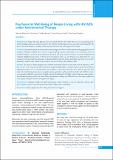Please use this identifier to cite or link to this item:
https://hdl.handle.net/20.500.14356/1019| Title: | Psychosocial Well-Being of People Living with HIV/AIDS in Chitwan District, Nepal: a Mixed Method Study |
| Authors: | Khatiwada, Dipendra Baral, Rojina Shrestha, Shakti Poudel, Ramesh Sharma Chalise, Hari Prasad |
| Citation: | KhatiwadaD., BaralR., ShresthaS., PoudelR. S., & ChaliseH. P. (2022). Psychosocial Well-Being of People Living with HIV/AIDS in Chitwan District, Nepal: a Mixed Method Study. Journal of Nepal Health Research Council, 20(01), 115-123. https://doi.org/10.33314/jnhrc.v20i01.3993 |
| Issue Date: | 2022 |
| Publisher: | Nepal Health Research Council |
| Article Type: | Original Article |
| Keywords: | Anxiety depression HIV/AIDS perceived social support |
| Series/Report no.: | Jan-March, 2022;3993 |
| Abstract: | Abstract Background: Along with many physical issues associated with the HIV/AIDS there are socio-psychological ill-effects including depression, anxiety and stress. The antiretroviral therapy has been successful in prolonging the life but not much information is available on the psychosocial issues and social support from Nepal. Methods: Sequential explanatory mixed method study design was followed. All the patients undergoing antiretroviral therapy in Bharatpur Hospital above 18 years of age and giving consent to participate were conveniently selected. Validated Nepalese version of Becks Depression Inventory and Becks Anxiety Inventory tool while translated and validated Multidimensional Scale of Perceived Social Support scale was used Purposive In-depth Interview was conducted with open ended questionnaire to obtain qualitative data. Chi-square and logistic regression were used for quantitative analysis while manual content analysis was used to analyze the qualitative data. Results: The totals of 288 participants were included in the study About 43% had some level of depression, 98% had very low level of anxiety and almost half of the people had high support. In binary logistic regression model, the significant variables were sex, marital status and occupation. Females had 2.622 times more odds of depression than males, the risk of having depression in occupation group- agriculture and household was 3.661 and 2.508 time more as compared to jobholder respectively. Similarly, single individuals had 2.815 higher odds of depression than couples. Emotional disturbances and fear of vulnerability, stigmatization, dealing with difficulties were the major problems in these groups with good familial and organization support. Conclusions: Clinicians, health and AIDS professionals should routinely screen for depression among other interventions to promote psychological health in HIV/AIDS-positive individuals. Keywords: Anxiety; depression; HIV/AIDS; perceived social support. |
| Description: | Original Article |
| URI: | http://103.69.126.140:8080/handle/20.500.14356/1019 |
| ISSN: | Print ISSN: 1727-5482; Online ISSN: 1999-6217 |
| Appears in Collections: | Vol. 20 No. 01 (2022): Issue 54 Jan-March, 2022 |
Files in This Item:
| File | Description | Size | Format | |
|---|---|---|---|---|
| 3993-Manuscript-27877-1-10-20220606.pdf | Fulltext Download | 249.35 kB | Adobe PDF |  View/Open |
Items in DSpace are protected by copyright, with all rights reserved, unless otherwise indicated.
